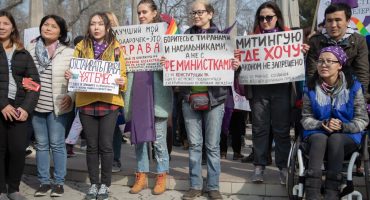Restrictions on free movement due to the coronavirus’s spread in Central Asia have affected the media sphere. The media are adjusting to the remote work and are facing obstacles in reporting.
Follow us on LinkedIn
Kyrgyzstan: Rejection of Accreditation for Independent Media
After the quarantine introduction in Kyrgyzstan, the media started to function online. Some media agencies sent employees on unpaid leave, while others work remotely.
Since March 25, a state of emergency and curfew are imposed in Bishkek. Restrictions on free movement have been introduced. The Commandant’s office issues the passes to the residents and the media; however, independent media’s accreditation was rejected.
The Commandant of the capital Almaz Orozaliev explained that this decision was made for journalists’ safety.
“The law applies to everyone, including the media. In addition, all questions can be sent via instant messengers. We analyzed the situation, this is necessary primarily for journalists’ safety. Many media in other countries work remotely. All questions can be addressed to the press centers, as well as via the hotline,” said Orozaliev, speaking at a briefing on March 30 (quote: 24.kg).
Kaktus.media’s editor Dina Maslova said that several employees were sent on unpaid leave due to the introduced restrictions, since they do not have opportunities to work at home. Employees who were engaged in analytics or on-site reporting also had to be sent on unpaid leave.
“First, during the emergency and a large news flow, when the authorities neither comment nor answer the questions, the preparation of analytical materials is difficult. Secondly, we cannot move around because of the Bishkek Commandant’s office decision: the media accreditation was rejected. The rest of the editorial staff is working from home with a greater load due to the information flow,” says Maslova.
Makhinur Niyazova, reporter of the 24.kg news agency, said that they had implemented shift work at the office, dividing journalists and editors into groups. In addition, some employees were sent on leave.
“Many have children. After all, parents also have responsibilities to educate their children now. Distance education has not been working properly so far, so we have to teach children ourselves, explain them everything, help with their homework,” says Niyazova.
Read also: Coronavirus Tests Central Asian Countries’ Readiness for Distance Education
Journalists admit that it is impossible to maintain a work-life balance due to the large information flow. There is no way to escape from work and relax, since the food and drink venues do not work.
Before the city was closed, journalists could move around for reporting, but now it is difficult to find information. State agencies stopped responding to requests; press secretaries redirect requests to the republican headquarters, which is not replying.
“Bishkek Commandant’s office is not responding at all or responds very late. At the same time, many citizens ask us questions, but it is difficult for us to check the information. The main information sources are the press services of state agencies and the Republican headquarters’ messages. Some information can be found exclusively through own sources,” said Maslova.
The media complain that during emergency, state bodies react to information only after its publication, sending refutations.
“There is a lot of information, but we cannot confirm or refute it, because we are not provided with official information. Moreover, we cannot publish it without confirmation, because the State Committee for National Security is constantly threatening to impose liability for the distribution of fake information. In their opinion, all alternative information is fake,” Niyazova notes.
At the same time, journalists note the growing traffic to news websites, but government agencies provide with incomplete or manipulative information.
The Media Policy Institute has reported a violation of the constitutional rights of citizens to access the information and freedom of speech, as well as the rights of journalists and media during emergency. In particular, Bishkek Commandant’s office is criticized. The restrictions on free movement deprives journalists of the opportunity to inform residents about the situation objectively.
It is noted that according to paragraph 9 of Article 17 of the Constitutional Law of the Kyrgyz Republic on State of Emergency, the local Commandant of the territory where the state of emergency has been introduced, must establish a special procedure for journalists’ accreditation and determine the order of their work.
Kazakhstan: Government Agencies Are Now Active, but Answer Questions After 5–6 Attempts
In Kazakhstan, journalists note increase in activity of state bodies: briefings and live broadcasts with officials are held. Along with this, the work schedule has changed a lot.
A journalist from a private media portal in Kazakhstan anonymously told that employees work in shifts in their office. Previously, they appointed employees on duty only during weekends, now they are on duty every day until the night.
“The world has not experienced such thing yet. Someone worked during the war, someone – during the election, and this situation is even more difficult. Living during such rough times, journalists gain new experience. This fatigue cannot be compared with what the doctors or police experience – they have to stand up for days,” the journalist said.
Despite the increased workload, he notes that he is glad to still have a job, because many are left without income during this period.
Read also: Fake News on the Coronavirus Pandemic: What Do Central Asians Believe in?
He noted that during this period many people have lost their jobs, even newspapers’ journalists were sent on unpaid leave. Information websites and television channels still work.
His colleague from another online media says that schedule is “completely insane and irregular”. Asel (not her real name) says that she spends all her time in front of the computer and with her phone, because she cannot miss anything.
While everyone talks about quarantine being a great time to view virtual tours of museums and theatres, online courses and self-development, journalists have none of this.
“There is a constant information flow about new infection cases, briefings by various departments, chats and social networks. There is no way to ignore this, no way to rest. In the first days after emergency announcement and infection cases, it was very difficult, we worked 14 hours a day. You do not have time to live at all,” she says.
Journalists say they do not even attempt to obtain a work-life balance, because the country has almost a wartime situation. Reporters receive information mainly from the state bodies of the city and republican levels, although there are complaints about communication.
“We do not always get answers to our questions; sometimes these questions are never even asked. In general, from the second or third time, the authorities react and respond to the population’s requests. The authorities hear and calmly explain – that never happened before. Perhaps, the coronavirus started some kind of dialogue between the population and the authorities,” the journalist believes.
Uzbekistan: Journalists Are “Digital Detoxing”
Since March 30, Uzbekistan restricted the traveling on a personal car without special permission. The total quarantine in the country was announced only on April 6. Using any kind of transportation is restricted. Citizens are not allowed to go outside unless it is absolutely necessary.
The same restrictions apply to journalists. Only limited categories of people can drive; media employees are not among them. Some journalists managed to receive permits to drive a personal car, but such cases are rare. From April 9, the issuance of such permits stopped completely.
Information sources are official websites and TV channels only. However, media reports state that informing on coronavirus is efficient measure.
“I get the information, just like before, from the sources, on official websites and by phone. Luckily, the Internet and mobile communications are working. I am not sending requests to state authorities, because I am tired of the previous experience. However, my colleagues say that information on coronavirus is received upon request and quickly enough,” said independent journalist from Tashkent.
In addition, the media report that the advertising market is down because of the coronavirus, and many media in Uzbekistan have faced financial difficulties. Some employees are sent on unpaid leave, salaries are cut and inefficient employees are fired.
At the same time, experts note that the reader interest has grown many times right now and the need for information is very high.
“Quarantine will not last forever, and the audience can survive. Sure, a certain part will lose their interest after quarantine’s completion, and yet, this audience will retain the “media memory” and will seek information on a trusted resource,” said the editor of one of the media in Uzbekistan.
Darina Solod, editor and cofounder of the Hook.report independent media, notes that journalists are at risk of burnout now: working from home erases a clear sense of the work schedule, and the work-life balance is disrupted.
“Therefore, it is necessary to force people to spend a day in digital detox: without logging in or reading, missing the news and online chats. During the first week, the schedule was completely different; now, after two weeks, we have normalized it: we have meetings, online streams, we are returning to the working climate,” says Solod.
According to her, the government agencies provide general statistics on the number of infected people and the situation now, but access to information is still hindered.
“It is not always possible to receive the information; it is not always possible to get an answer from them. Confusion very often arises: agencies can provide conflicting information. However, in general, this happens in a normal situation also, but now they are rushing around, they are working,” says Solod.
Title photo: platon.asia
If you have found a spelling error, please, notify us by selecting that text and pressing Ctrl+Enter.








